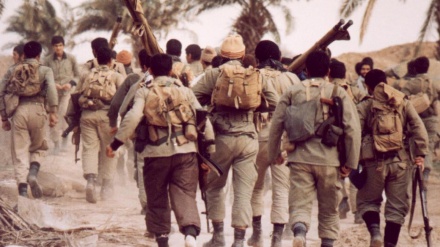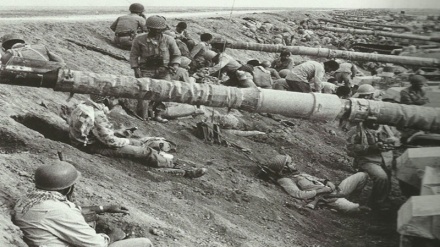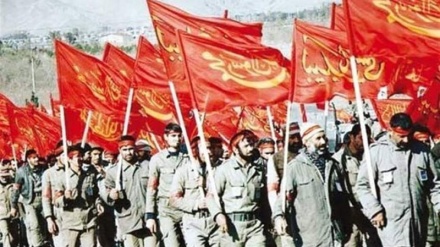Glimpses of Epic of the 8-Year Holy Defense (83)
In the final years of the imposed war, Saddam increased the number of forces and multiplied the equipment and arms of the Iraqi army. Through the full support of both Eastern and Western superpowers, the Iraqi dictator gained gigantic amounts of money to reorganize the army and equip it with state-of-the-art weaponry.
But on this side, the Islamic Republic of Iran faced with the worst drop of oil price and was unable to secure the sky-rocketing expenses of the war. The Iranian government was even unable to provide the running expenses of the country. One year after the Iraqi invasion into the Iranian soil, Iran got the upper hand through popular mobilization and surprise attacks on the Ba’athist army. But with the all-out supports of the US and Soviet Union for Saddam, and the direct involvement of Washington in the war, the last year of the war became very tough for Iran.
The supporters – and in fact accomplices- of Saddam exerted their utmost in the final year of the war to prevent Saddam’s defeat. The United Nations Security Council had ratified Resolution 598 a year before with the same purpose. Imam Khomeini, pointing to the report of the political authorities and military commanders, preferred to accept ceasefire and Resolution 598. He examined all reports of the commander of war on the situation of Iran’s capacities and also the reports of government officials on the economic situation of the country; hence he came to the conclusion that Iran should accept ceasefire. Following this great decision, then President of the Islamic Republic of Iran, Ayatollah Seyyed Ali Khamenei, sent a letter to then UN Secretary General,Javier Perez de Cuellar, where he had written, “The Islamic Republic of Iran has decided to officially accept the UNSC Resolution 598 due to the importance that it attaches for preservation of human lives, establishment of the regional and international justice, peace and security.”
De Cuellar, for his part, after receiving the Iranian president’s letter, announced that Iran had officially and unconditionally accepted Resolution 598. Then he immediately urged the Security Council to gather the members of the body for consultation on the issue. He also expressed hope that, within a week to 10 days, ceasefire would be put into effect.
The accepting of the UNSC Resolution 598 was a matter of great surprise and unbelievable for many Iranians. Imam Khomeini had likened it to drinking the cup of poison. In his message that he issued on the occasion of Hajj pilgrimage, he clarified some of the aspects of his decision on accepting the resolution. He said, “Accepting the resolution was really a very bitter and sad matter for all, especially for me; as I believed till a few days ago in the same method of defence and the announced stances on the war, and considered it to the benefit of the system, the country and the revolution. But, owing to some events and factors that, I refuse to mention for the moment and they will be clear in future God willing, and according to the opinion of all political and military experts at high levels in the country, whom I trust in their commitment, thoughtfulness and honesty, I agreed with accepting the resolution and ceasefire; and in the current juncture, I see it to the benefit of the revolution and the system.”
As a matter of fact, Imam Khomeini tried to prevent chaos in those sensitive circumstances and refuse to mention some of the issues that had originated in the past. He didn’t want to see discord among the forces of the Islamic Revolution. Elsewhere in his message, the Imam said, “These days, some people, due to their sentiments, may talk of whys and dos and don’ts, though this is a very beautiful value per se; but now it is not the time to embark on it.”
However, Saddam wasn’t going to accept the UNSC Resolution 598 as he considered himself to have the upper hand in the war. While the UN chief was making a lot of effort to implement the resolution, there was no hope for countering Saddam’s obstructionism and the likely moves of the Iraqi army. The Iraqi dictator, knowing this issue, started to forge new political and propaganda pretexts to set the stage for fresh invasion into the Iranian soil.
On the early hours of Friday July 22, 1988, only three days after Iran’s positive response to Resolution 598, while the Iranian foreign minister was engaged in negotiations with Javier Perez de Cuellar, the Iraqi forces invaded Iran’s soil on two axes of Kushk and Shalamcheh. They captured some parts of the region and reached near Ahvaz-Khorramshahr road. The Iraqi forces captured almost 30 kilometers from the 125km road and tried very much to capture Khorramshahr. The news of the Iraqi army’s invasion was very bitter for people as they were reminded of the first days of the war and the heinous crimes that the Ba’athist army had committed in Khuzestan. Therefore, people were mobilized again and many of the combatants who had participated for years in the war, poured to the battlefield. The governor general of Ahvaz said in a report that, despite the enemy’s incursion up to the threshold of Ahvaz, due to the people’s widespread presence, conditions have totally changed. Next time you will hear more on this.
RM/SS


